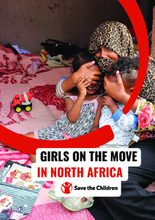Even though girls and women make up increasing proportions of the international migrant population of North Africa, and despite the prevalence of studies on migration in, through, and to North Africa, there is limited research focusing specifically on the experiences of women and girls. Girls who migrate face exposure to intersecting risks that can interfere with their ability to realise their human rights and fulfil their potential as individuals. Restrictive gender norms and gender inequalities affect critical aspects of girls’ migration journeys, influencing their motivations and decisions prior to departure, their experiences in transit, and the challenges they face integrating within their countries of destination.
This study aims to address this gap in migration research, by developing a holistic and gender-specific understanding of the migratory patterns and experiences of girls in, through, and to North Africa. To do so, the research team employed a qualitative research approach, informed by child- and gender-sensitive practices, to collect data from girls and boys in Italy, Spain, Morocco, and Tunisia. The participants ranged in age from 9–24-years-old and came primarily from sub-Saharan African countries including Cameroon, Ivory Coast, Democratic Republic of Congo, and Guinea, as well as Tunisia, Morocco, Algeria, and Libya. Additional data was collected remotely with selected key informants in Libya. In total 68 girls and young women and 24 boys and young men were interviewed. The inclusion of boys in the sample, while small, was necessary to ensure a gender-inclusive perspective. All participants were at various stages in their migratory journeys and provided unique, contextualised information regarding the challenges and opportunities faced by migrant girls and boys.

